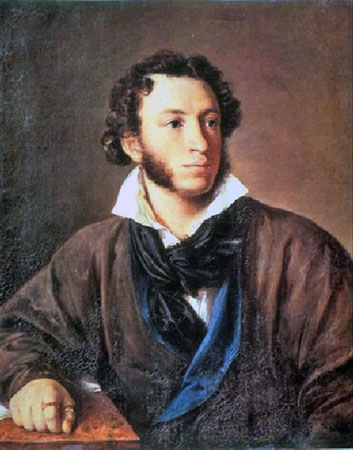Early Life and Background
Site Of The Day
Contacts and who we are
How to start bidding
Market, price, showcase
General guides
Alexander Sergeyevich Pushkin (6 June [O.S. 26 May] 1799 – 10 February [O.S. 29 January] 1837) was a Russian poet, playwright, and novelist of the Romantic era. He is considered by many to be the greatest Russian poet, as well as the founder of modern Russian literature. Pushkin was born into the Russian nobility in Moscow. His father, Sergey Lvovich Pushkin, belonged to an old noble family. One of his maternal great-grandfathers was Major-General Abram Petrovich Gannibal, a nobleman of African origin who was kidnapped from his homeland by the Ottomans, then freed by the Russian Emperor and raised in the Emperor's court household as his godson. Aleksandr Pushkin published his first poem at the age of 15, and was widely recognized by the literary establishment by the time of his graduation from the Tsarskoye Selo Lyceum. Upon graduation from the Lycée, Pushkin recited his controversial poem "Ode to Liberty", one of several that led to his exile by Emperor Alexander I. While under strict surveillance by the Emperor's political police and unable to publish, Pushkin wrote his most famous play, Boris Godunov. His novel in verse Eugene Onegin was serialized between 1825 and 1832. Pushkin was fatally wounded in a duel with his wife's alleged lover (her sister's husband), Georges-Charles de Heeckeren d'Anthès, also known as Dantes-Gekkern, a French officer serving with the Chevalier Guard Regiment.

Alexander Sergeyevich Pushkin (6 June [O.S. 26 May] 1799 – 10 February [O.S. 29 January] 1837) was a Russian poet, playwright, and novelist of the Romantic era. He is considered by many to be the greatest Russian poet, as well as the founder of modern Russian literature. Pushkin was born into the Russian nobility in Moscow. His father, Sergey Lvovich Pushkin, belonged to an old noble family. One of his maternal great-grandfathers was Major-General Abram Petrovich Gannibal, a nobleman of African origin who was kidnapped from his homeland by the Ottomans, then freed by the Russian Emperor and raised in the Emperor's court household as his godson. He published his first poem at the age of 15, and was widely recognized by the literary establishment by the time of his graduation from the Tsarskoye Selo Lyceum. Upon graduation from the Lycée, Pushkin recited his controversial poem "Ode to Liberty", one of several that led to his exile by Emperor Alexander I. While under strict surveillance by the Emperor's political police and unable to publish, Pushkin wrote his most famous play, Boris Godunov. His novel in verse Eugene Onegin was serialized between 1825 and 1832. Pushkin was fatally wounded in a duel with his wife's alleged lover (her sister's husband), Georges-Charles de Heeckeren d'Anthès, also known as Dantes-Gekkern, a French officer serving with the Chevalier Guard Regiment.
Born in Moscow, Pushkin was entrusted to nursemaids and French tutors, and spoke mostly French until the age of ten. He became acquainted with the Russian language through communication with household serfs and his nanny, Arina Rodionovna, whom he loved dearly and to whom he was more attached than to his own mother.
He published his first poem at the age of 15. When he finished school, as part of the first graduating class of the prestigious Imperial Lyceum in Tsarskoye Selo, near Saint Petersburg, his talent was already widely recognized on the Russian literary scene. At the Lyceum, he was a student of David Mara, known in Russia as David de Boudry [fr], a younger brother of French revolutionary Jean-Paul Marat. After school, Pushkin plunged into the vibrant and raucous intellectual youth culture of St. Petersburg, which was then the capital of the Russian Empire. In 1820, he published his first long poem, Ruslan and Ludmila, with much controversy about its subject and style.
Critics consider many of his works masterpieces, such as the poem The Bronze Horseman and the drama The Stone Guest, a tale of the fall of Don Juan. His poetic short drama Mozart and Salieri (like The Stone Guest, one of the so-called four Little Tragedies, a collective characterization by Pushkin himself in 1830 letter to Pyotr Pletnyov) was the inspiration for Peter Shaffer's Amadeus as well as providing the libretto (almost verbatim) to Rimsky-Korsakov's opera Mozart and Salieri.
Russia
Russian Art
Identity, class, revolutionism
Frida Kahlo did not receive many formal awards during her lifetime, as her work was not widely recognized until after her death. However, she did receive some notable recognition or award:
Site Of The Day
Site Of The Month
Site Of The Month
Site Of The Day